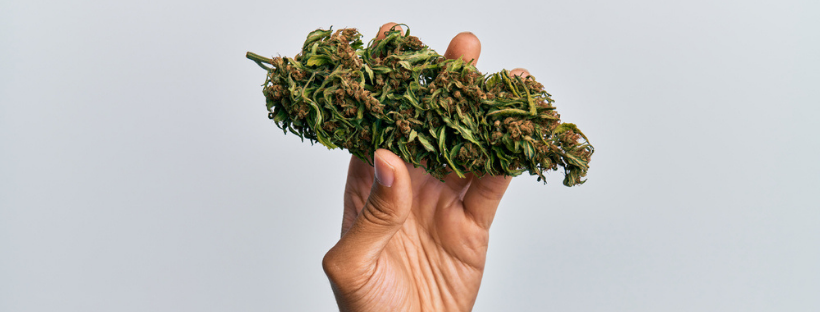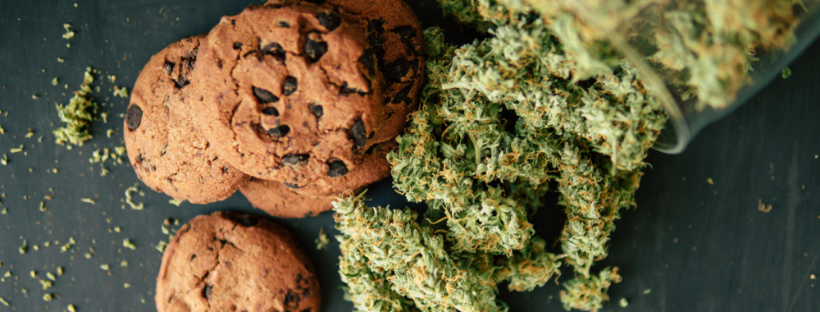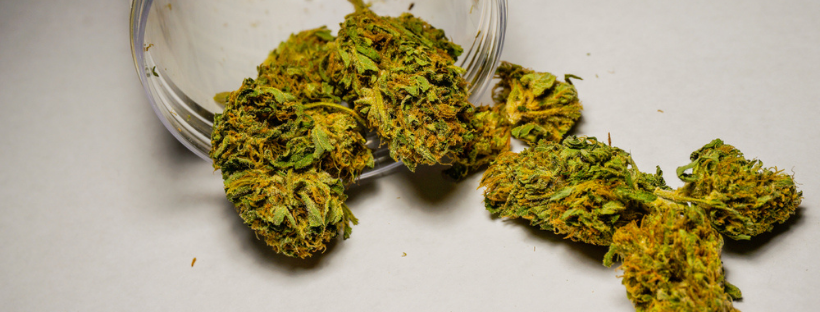Cannabis
Effects of Marijuana Use: How Weed Affects Your Mind and Body
Marijuana is one of the most used mind-altering substances in the U.S. At the state level, the general public can buy the drug at licensed dispensaries and drugstores. This is despite cannabis’ official designation under federal law as a Schedule 1 drug which means it is prohibited with no accepted medical use.
As legalization at the state level continues, more and more people are curious about the effects of marijuana use. Below, we look at the different ways in which cannabis affects your mind and body. Read on for more insights.
Pain Relief
Pot contains hundreds of active compounds called cannabinoids. Out of the huge list, there are two medically important active compounds:
- Cannabidiol (CBD)
- Tetrahydrocannabinol (THC)
THC triggers specific cannabinoid receptors located in the nerve and immune cells. When activated, the receptors work to reduce the sensation of pain.
THC is also famous for its psychoactive effects. In other words, it’s the active compound in cannabis that gets you high. The “high” that you get after consuming marijuana plays an important role in perceiving pain. It gives you euphoria that lessens your perception of pain, similar to the way pain medications work.
On the other hand, CBD won’t get you high. Instead, it eases pain in more physical ways. For example, it reduces inflammation and irritation in the affected area.
The difference between THC and CBD’s pain management mechanisms is that THC changes how the mind experiences discomfort while cannabidiol eases pain at the local source. So picking a cannabis product with a blend of CBD and THC does a great job alleviating the type of pain you’re experiencing.
Feel Good Sensation
Typically, THC activates the brain’s reward system via cannabinoid receptors. The reward system includes regions that produce pleasurable feelings when you do healthy pleasurable behaviors like eating or having sex.
Initially, many people thought that THC produced feel-good effects by flooding the brain with dopamine. Research has, however, debunked this myth by proving that consuming marijuana only secretes a modest amount of dopamine.
So if it’s not dopamine, what brings pleasure after consuming cannabis? Research points to a neurotransmitter known as anandamide. Anandamide is also known as the “bliss molecule,” and it produces a heightened sense of happiness and joy.
So when you smoke or vape cannabis, THC hits your brain cells within seconds and activates your brain’s neurons. This causes the neurotransmitter, anandamide, to bind to the correct receptor. This, in turn, produces a sense of bliss.
Sadly, anandamide quickly disintegrates, similar to other neurotransmitters. This means it can’t create a long-lasting state of happiness.

Euphoric High
The endocannabinoid system is found in the brain. It controls the discharge of virtually every neurotransmitter. Neurotransmitters are the means of communication used between brain neurons or cells.
One brain cell communicates with another by discharging neurotransmitters like serotonin, anandamide, or dopamine, into a tiny gap that separates each neuron from the other. The space is known as the synapse.
The postsynaptic neuron receives neurotransmitters across the synapse from the presynaptic neuron. As an information recipient, the postsynaptic neuron ultimately chooses whether to fire depending on the message it receives. After firing, for example, it can send back a “stop” response across the synapse through endocannabinoids that attach to the CB1 receptor.
When THC molecules hit the brain cells, they flood the endocannabinoid system with feedback messages the postsynaptic neurons did not send. In effect, the presynaptic neuron receives the feedback message to stop transmitting neurotransmitters. This affects the normal flow of information involving neurons. Consequently, you experience a euphoric high.
Increased Heart Rate
The normal human heart rate ranges from 60-80 beats a minute. When you inhale cannabis, your heartbeat increases dramatically. The National Institute on Drug Abuse claims that the increased heart rate may last from 20 minutes to three hours.
CB1 receptors are present across the entire body’s cardiovascular system. They are found on the heart muscle and surrounding blood vessels. They control the brain nerves that regulate heart rate. The THC in marijuana activates these CB1 receptors, which in turn results in a dramatic increase in heart rate among consumers.
The increased heart rate is a response to compensate for the low blood pressure brought about by THC. Low blood pressure occurs when THC enlarges the size of blood vessels, in turn compelling the heart to work incredibly harder to pump blood. So the higher the THC content, the harder the heart must work.
Time Perception
Cannabis users often report how minutes can feel like hours. In other words, their sense of time becomes distorted. But is there a scientific explanation for this time distortion phenomenon?
Research experiments back up the individual reports that cannabis prolongs time. For instance, in a 2001 research experiment, rodents that ingested chemicals that triggered their CB1 receptors mirrored time underproduction much like humans. In contrast, those that ingested a chemical that inhibited these receptors experienced time overproduction.
Time underproduction occurs because THC speeds up a person’s internal clock, making them think that external time is passing more slowly. As a result, five minutes might feel like 10 minutes. Once you sober up, however, these feelings disappear.
So how does marijuana speed up our internal, subjective clocks?
The thalamo-corticostriatal circuit is a brain network that’s crucial to how humans perceive time. This system of brain regions also contains numerous cannabinoid receptors. Thus, when THC-rich marijuana hits the brain, it upsets the normal operations of these receptors. For this reason, it leads to wrong time perception.

Increased Appetite
Besides getting high, an increase in appetite is perhaps marijuana’s most known effect. It’s popularly called “the munchies.” Both THC and CBD affect appetite in contrasting ways.
THC triggers cravings for sweet-tasting foods through a series of mechanisms as discussed below:
- First, THC boosts the hormone ghrelin, which induces feelings of hunger. Typically, when you have an empty stomach, your body releases the hunger hormone ghrelin. This, in turn, sends a signal to the brain to produce the feeling of hunger. THC is powerful because it can boost ghrelin and set off the hunger sensation even if you don’t have an empty stomach.
- Secondly, THC molecules bind to a region of the brain associated with appetite control. This action is controlled by the numerous CB1 receptors found in this particular section of the brain.
- Third, THC increases dopamine release. Dopamine is a hormone in the brain that’s associated with pleasurable feelings. So you feel good from eating. Moreover, THC may also boost your sense of taste and smell, thus increasing your appetite.
Unlike THC, CBD does not cause munchies. Instead, it may increase your appetite by easing nausea and calming your digestive tract and nervous system. You tend to eat more when you feel less nauseated. However, unlike THC, there is less evidence that backs up how CBD can increase one’s appetite.
Are you wondering about obesity due to the munchies effect? Well, research findings from a 2014 experiment revealed that using cannabis does not affect one’s body weight.
Better Sex Life
If you’ve added weed to your sex life, you must have experienced a variety of different thoughts and sensations as a result. Weed completely changes the bedroom vibe in the following ways:
More Sex
According to a 2017 study printed in the Journal of Sexual Medicine, cannabis users have about 20 percent more sex compared to people who don’t use marijuana at all. So over the duration of a year, they may have sex 20 times more than non-users.
Last Longer in Bed
Time appears to slow down after smoking cannabis. So the same effect happens in bed. It might be tempting to conclude that weed helps users last in bed. However, there’s the fact that weed alters your perception of time when having sex. So you might feel that sex lasts longer when you’re intoxicated, while there might not be really a major time difference from when you are clear-headed.
More Pleasurable Experience
A small study involving 373 women discovered that marijuana users tend to experience a more enjoyable sexual experience compared to those who didn’t use the drug. In particular, a number of women noted more pleasurable orgasms and a burning sex drive.

Decreased Sexual Inhibitions
It’s also worth noting that cannabis reduces all sorts of inhibitions. Researchers point to the drug’s ability to ease sexual anxiety and shyness as the reason behind the overall good sexual experience. This echoes numerous studies that reveal that weed affects all types of anxiety disorders.
Weed users also report being open-minded to try out specific sexual activities that they might have reservations about when sober. So it helps with sexual exploration.
On the flip side, having sex when high is more likely to make you throw out caution and engage in unsafe sex. In a 2010 study, there was a correlation between cannabis use and a reduced habit of condom use. As a result, this leads to a higher prevalence of STIs. Being high may also affect your interpretation of consent. You may misinterpret consent when your partner is not on board with your sexual wishes.
Increases Sedation Requirements During Surgery
A 2019 study found out that persons with a regular habit of consuming marijuana required stronger doses of sedation medication before their procedures. This was in comparison to their counterparts, who used little or no cannabis at all.
According to the findings, regular weed users needed the following increased percentages of sedation medications:
- Fentanyl (14 percent more)
- Midazolam (19.6 percent more)
- Propofol (220.5 percent more)
Researchers suggest that regular cannabis use desensitizes the receptor cells responsible for processing sedatives. For this reason, you may need more or stronger doses.
Causes Relaxation or Anxiety
For some people, cannabis helps to ease their anxiety and bring about a state of joyful relaxation. However, a sizable number also assert that marijuana triggers paranoia and panic mode—others experience both effects. Sometimes, a couple of puffs are what it takes to bring relaxation. Other times, similar few puffs lead to full-blown panic and anxiety.
It begs the question: Why is pot an acclaimed remedy for anxiety in some people and not others?
The trick is to understand the difference between the two major active compounds in cannabis, namely CBD and THC. And how it affects the type of anxiety you’re experiencing.
Types of anxiety
- Anticipatory
- Generalized
- Panic disorder
- Depression-related
Remember that these different types of anxiety react differently to marijuana. So if your type of anxiety results in a “blah” feeling, then THC is recommended for elevating your spirits. Likewise, persons who have depression-related anxiety may find THC helpful due to its euphoric properties.
However, THC, particularly in high doses, may lead to serious side effects like racing thoughts and increased heart rate. All these may worsen certain types of fretfulness. So CBD may be a better alternative.
Because cannabidiol is non-psychoactive, it doesn’t result in such negative effects. It influences your serotonin system. Thus, it can help to ease some anticipatory anxiety, panic disorders, and general social anxiety.

A Perfect THC and CBD Balance
A cannabis-derived product with both THC and CBD produces an entourage effect to ease your anxiety symptoms.
Ideally, look for a cannabis product with these two cannabinoids. CBD helps to counteract the psychoactive effects of THC. Ultimately, you experience a balanced effect. Always start slow and low with any cannabis dosage.
The Bottom Line
Cannabis is attracting a lot of attention for its array of effects, especially with its legalization at the state level. Researchers have only discovered the tip of the iceberg of this amazing plant. Plenty of questions still linger on how weed affects the body and brain. A lot is still unknown, so more research is required.
That said, if you choose to indulge in cannabis, do so responsibly. Everyone reacts differently to this herb, so talk to your doctor first before using it for any medicinal purpose. Ideally, start with a low dose and see how your body responds.


Pingback: How To Buy Good Weed - Purple Penthouse
Pingback: 12 Amazing Christmas Cannabis Edibles - Purple Penthouse
Pingback: Delta-8 Beginner's Guide for 2022 - Purple Penthouse
Pingback: How to Make a Cannabis Cheesecake - Purple Penthouse
Pingback: The Most Exotic Cannabis Strains Out There - Purple Penthouse